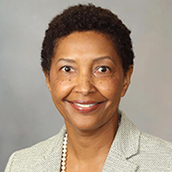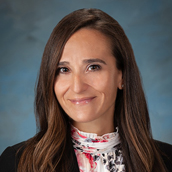Breast Surgeons Live
Back to Activities List
Session Title:
One Size Does Not Fit All: Tailoring Breast Care for Vulnerable Populations
Date & Time:
May 21, 2024, 7:00 PM–8:00 PM ET
Length:
1 Hour
CME Deadline:
May 21, 2025
This activity is open to members only:
Log InTarget Audience:
Surgeons and APPs with a special interest in the treatment of breast disease.
Objectives:
At the end of this activity, participants will be able to:
- Discuss the importance of health literacy in underserved patient populations.
- Discuss issues associated with minority patient participation in clinical trials.
- Address breast care issues within the LGBTQ+ community.
Description:
This webinar will identify strategies to reduce disparities and improve health equity in breast cancer treatment, including health literacy, safety net hospitals’ challenges, issues in the LGTBQ+ community, and minority participation in clinical trials.
Agenda:
Welcome and Introduction
Jane E. Mendez, MD
Health Literacy and Safety Net Hospitals
Daniela Cocco, MD, and Ayemoethu (Moe) Ma, MD
Minority Participation in Clinical Trials
Tanya Mosely, MD
Considerations Within the LGBTQ+ Community
Emil Fernando, MD, and Gary Ko, MD
Q&A
Health Equity Committee
Faculty:

Moderator—Jane E. Mendez, MD, FACS
Miami Cancer Institute
Miami, FL

Rosalinda Alvarado, MD, FACS
RUSH University Medical Group
Oak Park, IL

Dalliah Black, MD, FACS
Mayo Clinic
Rochester, MN

Daniela Cocco, MD, FACS
Valleywise Comprehensive Health Center
Phoenix, AZ

V. Tammy De La Melena, MD, FACS
Compass Oncology
Tigard, OR

Aye Moe Thu Ma, MD
UCSF
Oakland, CA

Tanya W. Moseley, MD, DBA, FACR, FSBI
MD Anderson
Houston, TX

Emil J. Fernando, MD, FACS
Allegheny Health Network
Pittsburgh, PA

Gary Ko, MD
Mount Sinai Hospital
Toronto, CA
References:
Health Literacy and Safety Net Hospitals
- Serrano-Gomez SJ, Sanabria-Salas MC, Fejerman L. Breast Cancer Health Disparities in Hispanics/Latinas. Curr Breast Cancer Rep. 2020 Sep;12(3):175-184.
- Bregio C, Finik J, Baird M, et al. Exploring the Impact of Language Concordance on Cancer Communication. JCO Oncol Pract. 2022 Nov;18(11):e1885-e1898.
- Luque JS, Logan A, Soulen G, et al. Systematic Review of Mammography Screening Educational Interventions for Hispanic Women in the United States. J Cancer Educ. 2019 Jun;34(3):412-422.
- Vadaparampil ST, Moreno Botero L, Fuzzell L, et al. Development and pilot testing of a training for bilingual community education professionals about hereditary breast and ovarian cancer among Latinas: ÁRBOLES Familiares. Transl Behav Med. 2022 Jan 18;12(1):ibab093.
- Spalluto LB, Audet CM, Murry VM, et al. Group Versus Individual Educational Sessions With a Promotora and Hispanic/Latina Women's Satisfaction With Care in the Screening Mammography Setting: A Randomized Controlled Trial. AJR Am J Roentgenol. 2019 Nov;213(5):1029-1036.
- Conley CC, Castro-Figueroa EM, et al. A pilot randomized trial of an educational intervention to increase genetic counseling and genetic testing among Latina breast cancer survivors. J Genet Couns. 2021 Apr;30(2):394-405.
- Diamond L, Izquierdo K, Canfield D, et al. A Systematic Review of the Impact of Patient-Physician Non-English Language Concordance on Quality of Care and Outcomes. J Gen Intern Med. 2019 Aug;34(8):1591-1606.
- Seible DM, Kundu S, Azuara A, et al. The Influence of Patient-Provider Language Concordance in Cancer Care: Results of the Hispanic Outcomes by Language Approach (HOLA) Randomized Trial. Int J Radiat Oncol Biol Phys. 2021 Nov 15;111(4):856-864.
Minority Participation in Clinical Trials
- Allison K, Patel D, Kaur R. Assessing multiple factors affecting minority participation in clinical trials: development of the Clinical Trials Participation Barriers Survey. Cureus. 2022 Apr 23;14(4).
- Rodríguez-Torres E, González-Pérez MM, Díaz-Pérez C. Barriers and facilitators to the participation of subjects in clinical trials: an overview of reviews. Contemporary clinical trials communications 2021 Sep 1;23:100829.
- Shea L, PesaJ, GeonnottiG, Powell V, Kahn C, Peters W. Improving diversity in study participation: patient perspectives on barriers, racial differences and the role of communities. Health Expectations. 2022 Aug;25(4):1979-87.
- Clark LT, Watkins L, Piña IL, Elmer M, Akinboboye O, Gorham M, Jamerson B, McCullough C, Pierre C, Polis AB, PuckreinG. Increasing diversity in clinical trials: overcoming critical barriers. Current problems in cardiology. 2019 May 1;44(5):148-72.
- National Institute on Minority Health and Health Disparities Diversity and Inclusion in Clinical Trials website: Direct Link.
- Annas GJ. Beyond Nazi war crimes experiments: The voluntary consent requirement of the Nuremberg Code at 70. American journal of public health. 2018 Jan;108(1):42-6.
Breast Care and Screening for Transgender Patients
- Eur J Surg Oncol. 2018 Oct;44(10):1463-1468.
- Eur J Surg Oncol. 2018 Oct;44(10):1455-1462.
- Breast. 2020 Oct;53:92-100.
- Aesthetic Plast Surg. 2019 Dec;43(6):1575-1585.
- Ann Plast Surg. 2018 Jun;80(6):679-683.
- J Community Health. 2023; 48(5): 889-897.
Breast Cancer Care for Lesbian and Bisexual Patients
- Williams AD, Bleicher RJ, Ciocca RM. Breast Cancer Risk, Screening, and Prevalence Among Sexual Minority Women: An Analysis of the National Health Interview Survey. LGBT Health. 2020;7(2):109-118. doi:10.1089/lgbt.2019.0274.
- Eckhert E, Lansinger O, Ritter V, et al. Breast Cancer Diagnosis, Treatment, and Outcomes of Patients From Sex and Gender Minority Groups. JAMA Oncol. 2023;9(4):473-480. doi:10.1001/jamaoncol.2022.7146.
Disclosures:
Use the link below to view disclosure information for all individuals and groups involved in the planning, implementation, and evaluation of this educational activity.
View Disclosure Information (pdf)
View Disclosure Information (pdf)


